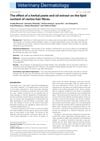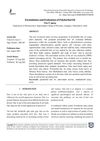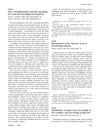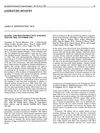 September 1998 in “JEADV. Journal of the European Academy of Dermatology and Venereology/Journal of the European Academy of Dermatology and Venereology”
September 1998 in “JEADV. Journal of the European Academy of Dermatology and Venereology/Journal of the European Academy of Dermatology and Venereology” The document concludes that individualized treatments for hair issues are effective, certain hair changes can indicate neurocutaneous diseases, specific lotions improve skin health, laser hair removal works but needs more study on long-term effects, men's cosmetics are diverse, peeling is effective but can have side effects, and facial pigmentation is often due to overactive skin cells.
 4 citations,
December 2018 in “Macedonian Journal of Chemistry and Chemical Engineering”
4 citations,
December 2018 in “Macedonian Journal of Chemistry and Chemical Engineering” A new method accurately measures amino acids in treated hair, showing bleaching reduces amino acids while protein treatments increase them.
 2 citations,
March 2017 in “Veterinary dermatology”
2 citations,
March 2017 in “Veterinary dermatology” Herbal paste and oil extract might improve dog hair quality by retaining lipids.
 March 2011 in “Focus on surfactants”
March 2011 in “Focus on surfactants” Several companies launched new hair care ingredients in 2011 to improve conditioning, color retention, combability, and heat protection.
 January 2024 in “Deleted Journal”
January 2024 in “Deleted Journal” Essential oils may help hair health but lack strong scientific proof and can cause allergic reactions.
 September 2023 in “Small animal advances”
September 2023 in “Small animal advances” The kitten's skin infection was cured with medication in three weeks.
 3 citations,
March 2005 in “Journal of the American Academy of Dermatology”
3 citations,
March 2005 in “Journal of the American Academy of Dermatology” The lotion and shampoo effectively treated scalp seborrheic dermatitis.
2 citations,
August 2019 in “Journal of drug delivery and therapeutics” The shampoo named Herbello, made with natural ingredients, promotes hair growth and fights dandruff.
 June 2023 in “Hanguk ingeurie hakoeji”
June 2023 in “Hanguk ingeurie hakoeji” Eating fermented protein made from black bean powder twice a day for 60 days improved hair density but not scalp condition or hair thickness.
1 citations,
February 2024 in “Diversity” African plants can treat hair issues and may help with diabetes.
 1 citations,
August 2021 in “International journal of scientific research in science and technology”
1 citations,
August 2021 in “International journal of scientific research in science and technology” The polyherbal hair oil promotes hair growth, reduces hair loss, and is safe to use.
 June 2024 in “International Journal For Multidisciplinary Research”
June 2024 in “International Journal For Multidisciplinary Research” Herbal powder shampoo is effective, safe, and beneficial for various hair needs.
 April 2024 in “Dermatologic surgery”
April 2024 in “Dermatologic surgery” Microneedling at a depth of 0.5 mm is the most effective single treatment for hair loss among the tested depths.
 October 2023 in “International journal of science and research”
October 2023 in “International journal of science and research” Ayurvedic treatments can effectively regrow hair in Alopecia Areata without side effects.
 June 2022 in “International Journal for Research in Applied Science and Engineering Technology”
June 2022 in “International Journal for Research in Applied Science and Engineering Technology” The herbal shampoo made from Piper Betel and Psidium Guajava leaves was safe, promoted hair growth, and reduced hair fall.
 February 2018 in “Journal of dermatology & cosmetology”
February 2018 in “Journal of dermatology & cosmetology” Combining microdermabrasion with steroid injections improves hair regrowth in scalp alopecia areata.
 August 2009 in “Journal of Oral and Maxillofacial Surgery”
August 2009 in “Journal of Oral and Maxillofacial Surgery” Hair transplantation and micrografting are effective for facial enhancement with nearly 100% graft survival when done carefully.
 March 1997 in “The American Journal of Cosmetic Surgery”
March 1997 in “The American Journal of Cosmetic Surgery” A new hair transplant method showed promising results and a study found how deep a CO₂ laser can penetrate skin.
 434 citations,
October 2003 in “PTR. Phytotherapy research/Phytotherapy research”
434 citations,
October 2003 in “PTR. Phytotherapy research/Phytotherapy research” Natural products in cosmetics are beneficial for skin and hair care with low toxicity.
 152 citations,
December 2007 in “Gender Medicine”
152 citations,
December 2007 in “Gender Medicine” Male and female skin differ due to hormones, affecting conditions like hair loss, acne, and skin cancer, and suggesting a need for gender-specific treatments.
 66 citations,
January 2000 in “Dermatology”
66 citations,
January 2000 in “Dermatology” Dandruff is a common, winter-worsened scalp condition linked to inflammation and microorganisms, treatable with products like ketoconazole, and may affect hair loss.
65 citations,
September 2014 in “BMC genomics” Different hair types in mammals are linked to variations in specific protein genes, with changes influenced by their living environments.
 51 citations,
January 2014 in “Pediatric Clinics of North America”
51 citations,
January 2014 in “Pediatric Clinics of North America” The guide explains how to identify and treat children's hair loss, including fungal infections, autoimmune disorders, hairstyle changes, self-correcting conditions, and behavioral therapy for hair-pulling.
40 citations,
January 2018 in “International journal of trichology” Healthy scalp reduces hair loss by managing oxidative stress.
 26 citations,
January 2007 in “Organogenesis”
26 citations,
January 2007 in “Organogenesis” Bioengineering can potentially treat hair loss by regenerating hair follicles and cloning hair, but the process is complex and needs more research.
 25 citations,
July 2021 in “Journal of Medical Virology”
25 citations,
July 2021 in “Journal of Medical Virology” COVID-19 can cause various skin issues, including rashes and hair loss, which usually heal on their own and don't always indicate severe illness.
 18 citations,
November 2016 in “Journal of Oral and Maxillofacial Surgery”
18 citations,
November 2016 in “Journal of Oral and Maxillofacial Surgery” Platelet-Rich Plasma (PRP) treatment can potentially increase hair density and quality in people with hair loss, but more research is needed to confirm its effectiveness.
15 citations,
August 2020 in “Analytical chemistry” Hair lipids do not protect against humidity.
 15 citations,
October 2003 in “Dermatologic Surgery”
15 citations,
October 2003 in “Dermatologic Surgery” Minoxidil, finasteride, and hair transplantation combined give best results for hair loss.
 13 citations,
August 2019 in “Journal of Ethnopharmacology”
13 citations,
August 2019 in “Journal of Ethnopharmacology” Eleven traditional Polynesian plants show potential for natural anti-aging, hair growth, and skin brightening products.
























